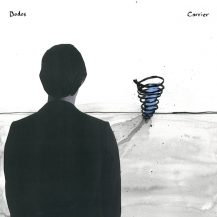The Dodos – “Carrier”
“From day one, The Dodos have defied convention and type.” -GT
Grafton Tanner
9
out of 10
The Dodos
Carrier
August 27, 2013
Polyvinyl Records
From day one, The Dodos have defied convention and type. Founders Meric Long and Logan Kroeber are not your typical indie rock musicians. Long, a multi-instrumentalist with a background in West African Ewe drumming, has remained one of the few restless musical forces in indie music, and Kroeber’s past experience with the metal genre gives The Dodos that slight, biting edge over other rhythm-centric indie bands (Yeasayer, particularly). Throughout their career, The Dodos have proved to be something of a dividing line between the sweeping sounds of Arcade Fire-styled arena indie and the quirkiness of lo-fi folk. They have remained ever-serious in quest of meaningful, adventurous music but have relatively stayed true to their acoustic roots throughout most of the discography.
Carrier is something else entirely. It is an album born from grief and is beautifully pained in its execution. Much of this freshness stems from Long’s collaborations with Women guitarist Christopher Reimer, and the Canadian art rock band’s influence is everywhere on this album. Angular guitar lines slice through staccato, unilateral rhythms to create something both mechanical and noisy, but that is not where Women’s influence ends. On February 21, 2012, a year after touring with The Dodos, Reimer passed away in his sleep. In many ways, Carrier is an ode to Reimer, whose genius is most apparent in Women’s two stellar albums and whose musical legacy lives on with The Dodos.
This is an album about death, first and foremost – a theme that many indie bands shy away from in a post-Funeral musical climate. Even the song titles evoke the great leveler and all things big and small it affects (“Transformer,” “Relief,” “Family,” “Destroyer”). As Long sings of death and its permanence, he also questions the role of songwriting in teasing out the complexities of such great change. “What is a song? What is love?” are a few of the questions posed by Long in the opening track “Transformer,” all while two guitars play in completely different time signatures. Such clashes on Carrier are meant to confuse and create discord without sounding like anyone else other than The Dodos. “Substance” continues in such regard with a start-and-stop drum and guitar pattern that is worth a head scratch or two when attempting to iron out the rhythms.
Rhythm has always directed The Dodos’ songwriting, but when the polyrhythms on Carrier begin to push you away, Long and company reel you back in with a song like “Stranger,” which places Reimer’s influence again to the forefront. Unfortunately, some of this push and pull is left out in the album’s middle, but The Dodos surprise yet again with “The Current,” a heavy (for The Dodos) guitar-led song with a fuzzed out ending.
All of Carrier points to the penultimate track, “Death.” In it, Long provides the thesis: “Death, what could be worse?/ If I had something to complain about.” Along with “The Ocean,” “Death” is a testament to music as therapy. To work through meaningful art is to work through that which changes us, and for The Dodos, quite a lot has moved them to ask the “bigger” questions: how do we move on from death? What can a song do to change a person? Or, to leave with one of Long’s, “Why won’t you be where I want you to be?”
-Grafton Tanner, August 20, 2013 [youtube id=w-FALzDrQdg]